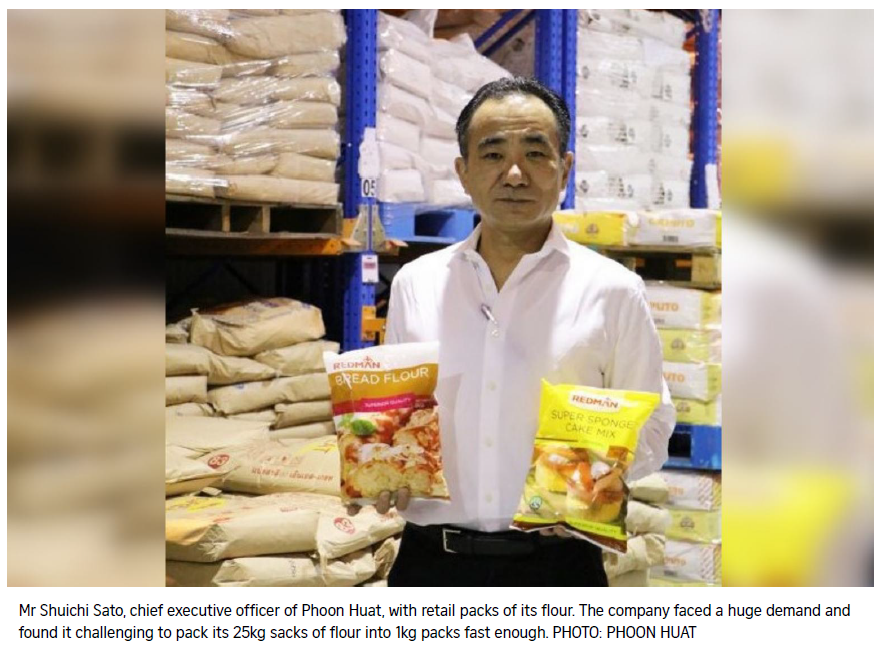
The Straits Time | Jun 14, 2020, 5:00 AM | Tan Hsueh Yun
From working around the clock to investing in a new machine – baking ingredients supplier Phoon Huat and flour miller Prima share challenges they faced to fuel home bakers during the circuit breaker period.
When all this is over, when life gets to whatever the new normal is going to be, people around the world might look back at how the coronavirus pandemic got them to wear masks as part of daily life, got them accustomed to working from home, got them elbow bumping instead of shaking hands.
And got them baking.
The world hunkered down to flatten the curve of infections. People stuck at home at a bewildering time sought – and continue to seek – comfort in combining flour, sugar, eggs and milk to make something delicious.
Follow a recipe and something golden brown and smelling wonderful will surely emerge from the oven. That ritual, in constant repeat mode everywhere, is a surefire win at a time when victories are hard to find.
Seasoned bakers upped the ante and tackled more challenging recipes. Newbies got in on the act. Social media continues to be flooded with pictures of muffins, cakes, bread and those Basque cheesecakes with the burnished tops.
In Singapore, the surge in demand for baking ingredients rivalled that for toilet paper and instant noodles. It was as if everybody had the same idea. Gotta bake.
The result of that groupthink? Supermarkets shelves were cleaned out of flour of every kind. Butter. Sugar. Yeast. Cream cheese.
Ingredients people had been taking for granted disappeared temporarily.
Two companies in Singapore – baking ingredients supplier Phoon Huat and flour miller Prima – faced a challenging time.
How they worked out the kinks to answer the loud demands from home bakers is a hard-won victory in the Covid-19 chronicles; case studies for how to be nimble in a crisis.
WRITE-OFFS AND COMPLAINTS
There was one point during the circuit breaker period when Phoon Huat was battered from all sides.
It supplies some 5,000 of about 7,000 hotels, restaurants, cafes, food-processing factories and central kitchens here; but many of its food service customers cancelled their orders, when eating places could no longer have dine-in customers.
Mr Shuichi Sato, its chief executive officer, tells The Sunday Times that Phoon Huat faces delays in payment and has been unable to contact some of its business customers, even.
He says there will have to be write-offs, because some of the ingredients it supplies are perishable, or have a short shelf life.
There were challenges on the retail front too.
The authorities complained that queues outside its retail stores stretched too long. The wait was, at times, two hours to get in.
Customers became frustrated when supplies dried up temporarily. They went to the company’s Facebook page to complain loud and long; about the shortages, about long queues, about the shorter opening hours, about online orders with items that were sold out and could not be delivered.
When, in a bid to manage queues, it implemented a system early last month in which people were let into the store on odd or even numbered days depending on the last digit of their identity card numbers, there was another uproar. Why was a non-government company collecting identity card information?
Frustrated customers took it out on the company’s staff. Some employees broke down in tears.
“Very drama,” says Mr Sato, adding that the company was just trying to manage queues and did not record the information.
It stopped this system on June 2, when Singapore emerged from circuit breaking to Phase One, and the clamour for ingredients eased.
He says that sales usually go up by 10 to 20 per cent during Chinese New Year, Hari Raya and Christmas. But when the circuit breaker began in earnest, the company started seeing spillover customers, who could not buy flour, pasta and yeast in supermarkets.
There was also a run on these products on its online store, which it launched in early March.
Mr Sato says: “We went from zero deliveries a day to a few hundred deliveries a day now.”
SHIFTS AROUND THE CLOCK
Similarly, Prima’s sales go up during Chinese New Year, Hari Raya and Christmas, by 20 to 40 per cent.
Mr Steven Yeo, general manager of Prima, says sales peaked last month, at 3.5 times more than a typical month last year. But it had been seeing a steady increase since March, when sales inched up to 1.5 times the average monthly figure last year.
The irony is that while home bakers were desperately seeking flour, there was plenty of it.
Both Prima and Phoon Huat say they had sufficient stock, but faced challenges packing it into retail-friendly sizes.
What home baker, even an avid one, would contemplate buying a 25kg sack of flour?
Mr Yeo says: “We had ample stock and wheat in our silos to meet the increased demand. Our diverse and secure sources of wheat from various continents ensure our constant supply.”
He adds that Prima, which was established in 1961, has been working with some of these suppliers for more than 50 years.
“We were working round the clock, with two staggered shifts,” he says. “Despite that, our flour was flying off the shelves faster than we could bag and pack them and retailers could replenish them.
“Retailers were asking for more stocks and we also received consumer inquiries on where to find our flour. We had sufficient stock of wheat and flour, but we had maxed out our capacity for household packs.”
So Prima invested in a new packing machine.
“The machine was sourced and installed in nine days,” he says. “From April 24, our production and engineering teams worked to get it up and running. They even worked over two weekends and public holidays.”
The new packing line started operating on May 3 and Prima was able to increase its packing capacity for household packs by 75 per cent.
This flour was delivered directly to stores, so customers could get their hands on it quickly.
PACKAGING AND LABOUR WOES
Phoon Huat too, found it challenging to package big quantities of flour, cream cheese, yeast and other ingredients into retail-friendly sizes.
Like other companies, it faced limits on how many workers could work at any one time. Overseas suppliers also had problems packing ingredients into smaller-sized retail packs because of the shortage of packing materials worldwide.
Mr Sato says: “We had stock, fortunately or unfortunately. That’s why we could keep supplying consumers. But we didn’t have enough packing capacity. We had tonnes of cream cheese; in 2kg, 14kg packs.
“Who would dare to buy 2kg of cream cheese? Our Australian cream cheese suppliers didn’t have packaging material for small packs. Our flour supplier in Italy had sleepless nights changing the packaging from 25kg to 1kg.”
During the circuit breaker period, Phoon Huat, a 73-year-old company with about 400 employees, saw its staff quota reduced to about 150.
There could only be 150 employees in total working in its factory, in logistics and in its retail shops. The company instructed support staff to work from home, and cut the operating hours for the retail shops.
Mr Sato says: “With the reduced manpower, our factory and logistics faced a crunch and stocks in the shops were compromised as retail packs were not produced fast enough. We appealed to the Ministry of Trade and Industry for an increase in staff quota and it was restored to slightly over 300.
“Then, we were able to engage external temporary staff, who were on no-pay leave from their jobs in other industries, for example the airline industry, to help out in our retail shops.”
Some production lines – for flour, premixes and packing – operated on three shifts, instead of one, for two to three weeks last month.
The online site, which started with just three staff, now has nine people to process orders.
Mr Sato, who has been on the job for two years, adds that there is stock now allocated to the e-commerce part of the business.
“Almost all orders can be fulfilled,” he assures.
BEST THING SINCE SLICED BREAD
In the midst of all this, the search for new sources of ingredients never ends for both companies.
Phoon Huat recently launched flour from Vietnam and Malaysia. It is in discussions to bring in a Japanese brand of flour. It now carries the premium Tomiz brand of baking ingredients, and there are plans to pack its flour in Singapore, to reduce the cost to consumers.
Later this year, it will open two more retail stores – in Bukit Panjang Plaza and Jurong East – to bring its total number of stores to 16 across the island.
The bulk of its business used to be supplying food businesses. Now, Mr Sato says, it is half business to business and half retail.
The viral baking craze took the company by surprise.
Mr Sato says: “Young or senior, male or female baking enthusiasts appeared. Baking has become a family bonding activity and also a favourite pastime at home, with the sharing of recipes via social media.”
Indeed, even as it grappled with customer complaints, the company’s Facebook page was a sea of serenity and positivity, with recipes and videos for making rainbow cookies, bubble tea and souffle pancakes.
To ride on the baking craze, Prima plans to share recipes using its products on its website. There are also plans to organise more baking contests and collaborations with household appliance brands, when it is safe to do so.
Mr Yeo adds: “Almost everyone was posting about baking adventures on social media. From butter and sugar buns to Hokkaido milk bread to sourdough bread, consumers were creating all types of bakes. Some even baked together with friends on Zoom. We are heartened that consumers have turned to baking and cooking during this period.”
Will The Great Singapore Bake Off continue?
Whatever happens when the world opens up again, bakers here can count on one thing. There will be enough flour. In 1kg packs.
Link to article: https://www.phoonhuat.com/wp-content/uploads/2020/09/200614-The-Straits-Times-Supplying-the-Great-Singapore-Bake-Off.pdf

